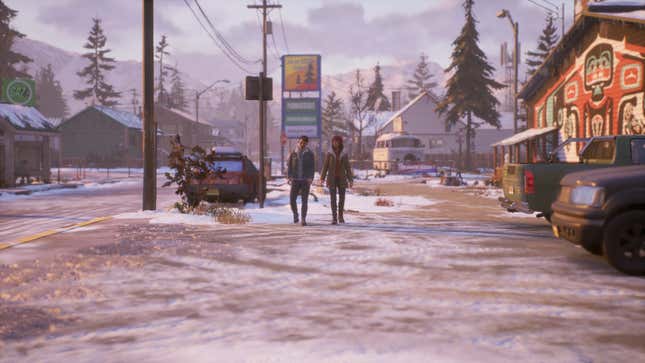
In a way, the first episode of Tell Me Why wants to convince you that people aren’t as bad as you think. It’s a weird message for me, a trans man playing a video game, to hear—both video games and the people who surround them can be worse than I think, and I’m constantly braced for some trans joke or violent plotline. Tell Me Why pulls off the impressive feat of showing everyone—both its trans protagonist and the people who’ve hurt him—as complicated and doing their best, without shying away from where they all fall short. It’s a supernatural story that takes place in rural Alaska, about as far from my own life as I can imagine, but at times it felt almost too real.
Tell Me Why is the latest episodic game from Dontnod, developers of the Life is Strange games. It has all the hallmarks of that series: supernatural powers, point-and-click roots, and choices that influence the story. It has a much shorter turnaround than those games, with its first episode launching today for Xbox and PC, and its second and third episode coming out over the next two weeks. Publisher Xbox Game Studios provided Kotaku with a copy of the full game, but it felt more natural to me to play and write about it at the same pace as other players will.
You play as twins Alyson and Tyler Ronan, who grew up in the town of Delos Crossing, Alaska. When the game starts in 2015, Tyler is leaving the juvenile detention-esque Fireweed, where he’s spent the past 10 years as a resident and then as a mentor to other troubled kids. Alyson is picking him up so they can return to Delos Crossing to sell their late mother’s house, where they experienced a traumatic event as children. They’re both in agreement that their childhood was fucked up, and they’re not wrong, but they quickly find some information that throws their memories of their past into question, and shows them new sides of their mother. The pair revisit the people and places they grew up with, looking for answers.
You do this by clicking on interactive nodes in the environment or talking to characters and choosing between dialogue options. The twins can communicate telepathically, and when they return to Delos Crossing, they develop a new power: the ability to see memories, portrayed as glittering ghosts the game guides you toward with twinkling lights and controller rumble. You need to follow these memories to find hidden objects or get information that will help you in conversations with other characters. In some instances Tyler and Alyson’s memories conflict—was their mom mad in that fight in the grocery store 10 years ago, or was her friend?—and you can choose which one is canon. These choices influence the twins’ relationship and the game’s action. At the end of the episode, you see a breakdown of how your choices stacked up against other players’, and get a sense of their effects.
The game felt a little janky at times on my PC; the characters can steer stiffly, and I sometimes had trouble accurately selecting nodes with my controller. Meanwhile, the supernatural gameplay threw me a little: it’s introduced so suddenly and so early into learning about the characters and their past that it felt a bit like overload. The characters’ ability to see memories is revealed as a new element of their simultaneously-introduced psychic link, and both are so quickly bypassed to get on with the story that I scoffed a bit. But I got used to it, and I soon understood how it’s essential to the game. It’s not my favorite element of the gameplay personally, especially when the game’s realistic elements are so rich, but fans of Life Is Strange might have an easier time with it.
I found the most compelling part of Tell Me Why to be its realism, including its rural Alaskan setting. On the ferry to Delos Crossing, Tyler and Alyson talk about bear safety and their indigenous neighbors’ potlatches. There are posters for dogsled races, and how mining is affecting the fish population people depend on for work and survival. Dontnod worked with Tlingit artists and consultants when creating Delos Crossing, and these elements are present without the game going out of its way to explain them to players, like me, who might not be familiar. Delos Crossing feels like a real town, with shared landmarks and things everyone knows about everyone else, making Tyler’s return there all the more fraught.

When it was first revealed that Tell Me Why would have a trans guy protagonist, I was skeptical. I’ve spent nearly 20 years as an out trans man, doing trans theater and activism, teaching trans writers and publishing trans fiction. I’ve thought a lot about how trans stories are told and how they could be better. This has, perhaps unfortunately, exhausted some of my patience for trans narratives; I’d much rather spend my time on stories by and for trans people than see elements of my life told to me by game studios. When Dontnod published a sort of content warning for the game, reassuring players that it wouldn’t feature the use of Tyler’s birth name nor portray any violence against him or other queer characters, I both appreciated it and rolled my eyes. On the one hand, it was good information to know, especially following the hurt many trans players of The Last of Us Part 2 felt after being blindsided by the game’s traumatic trans storyline. On the other hand, it made me worry the game would lean back from telling a fully realized story for fear of offending people, treating its trans character with kid gloves.
Despite my fears, Tell Me Why completely won me over with how it tells Tyler’s story. His trans identity is introduced through things in his room early in the game—a book about healthy masculinity for trans guys (which I would like to read, please), a poster for a trans right rally, his calendar with his testosterone shot marked down each week. Tyler talks about being trans easily; he’s past the “figuring out his gender” stage and just exists as a trans man, something we rarely see in video games. Alyson never falters when introducing him as her brother, even to people who would have known them both growing up.
Tell Me Why portrays the particularly trans horror of going back to your hometown after you’ve transitioned with nuance and honesty. As a twin myself, I’ve been party to “you remember my brother” countless times, followed by the silent freefall of a person you’ve known since you were little reconsidering how they feel about you before your eyes. It’s frightening and painful to come back to a place you think belongs to you, only to feel like you’ve given up that claim because you grew up to be different than people expect. The residents of Delos Crossing struggle with Tyler’s transition in different ways: an early encounter with Sam, a friend of their mom’s, has Sam marvel, “You look like a real man,” in the exact way so many old friends have deployed it at me, as some kind of well-meaning but ignorant compliment. Tyler stands his ground, and the two argue a bit. “You gotta excuse us old guys,” Sam apologizes, and Tyler says, “I really don’t.” Sam protests, “You kids keep changing the rules. You can’t expect us to keep up.”
I felt for Sam in this moment, as I felt for all of Delos Crossing’s cis residents. Conflict over Tyler being trans is a key feature of Tell Me Why’s main plot, but in the interactions of its first episode, people react in complicated, realistic ways. I could see how hard they were all trying, how carefully they were threading not just seeing a transitioned Tyler for the first time, but also for the first time since the town-rocking event that sent him away. I related so much to Tyler’s struggle to be generous to them without compromising himself in the process. When Alyson introduced Tyler to her best friend Michael, a queer Tlingit man who wants to be a chef, I not only developed an instant crush on him, but felt relieved Tyler had found someone in town he could connect with. Tell Me Why doesn’t cut its fumbling cis characters any slack, but it uses their reactions to make broader points about how people relate, if they should or how they can stay connected. It shows messy relationships bound by history and place, and its first episode leaves room for the twins’ anger at their mother while acknowledging her life was larger than just what they experienced.

When Tell Me Why was first announced, I said on Twitter that representation alone doesn’t mean much to me. But when Tyler first appeared on screen—not just a trans guy character who, like me, is well into his transition, but one whom I knew was trans going in—it completely undid all my haughty suspicion. Tyler is voiced by trans actor August Aiden Black; maybe it’s the pandemic solitude talking, but hearing another trans man’s voice through my headphones made me uncharacteristically tear up. I often struggle with the way being an older trans guy can make me invisible to other trans and queer people; as I sometimes put it, the fact that other people usually can’t “tell” I’m trans doesn’t make me less trans. Feeling this way is often lonely, which I don’t like to admit because there are far more important issues facing trans communities, and because I’m not going to complain that now I’m only mildly worried when using a public restroom instead of afraid for my life. But it felt less lonely to see and hear another trans guy like me in a video game, even if his cliche trans guy undercut and scruffy facial hair make me feel ancient in comparison.
Tell Me Why’s first episode, “Homecoming,” took me about three hours to play, and I had to stop after the episode’s surprising ending to take the whole experience in. The first episode’s events weren’t all that intense, but they brought up so many memories of my own life and experiences that I needed a break. I leaned back in my chair and thought about my mom and my sister, and the painful road we’ve travelled to have the often uneasy relationship we have now. I’m not going to say the game made me see their side of our past and present disagreements, but it reminded me how all that complicated, difficult stuff is part of a trans life I’ve worked hard to create. I’m grateful to have this particular experience of my life, even when it hurts a whole lot. I’m excited to see how Tyler navigates his own version of it as Tell Me Why goes on.





